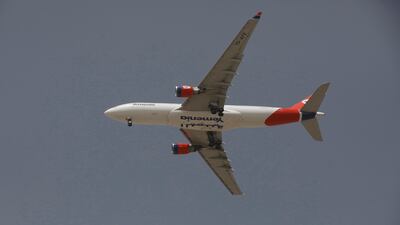More than 5,000 “ghost flights” have taken off or landed at UK airports since 2019, data has shown.
Environmental groups have accused airlines of “pouring kerosene on the fires" of climate change by sending empty planes into the sky to retain their sought-after flight slots.
Campaigners have for years been calling for the practice to end, with Greenpeace saying the damage ghost flights cause to the environment is equal to "the yearly emissions of more than 1.4 million cars”.
Alongside the ghost flights, 35,000 commercial flights that were less than 10 per cent full have journeyed to or from Britain in the past three years, figures from the Civil Aviation Authority show.
In one quarter during the Covid-19 pandemic, Heathrow Airport in west London recorded 663 near-empty flights to or from the US.
The data, first reported by The Guardian, sparked renewed calls from activists for the UK government to crackdown on ghost flights.
Bill McGuire, a climate scientist and volcanologist, said the CAA’s data left him speechless.
“Why is this allowed to happen? It is literally — and I do mean literally — insane,” he said.
He said that allowing empty or near-empty planes to fly during a climate crisis “is bonkers” and “has to be stopped”.
Steve Davies, head of education at the Institute of Economic Affairs, a think tank in the UK, said ghost flights were used so airlines did not lose their slots.
“The system encourages overuse of airport capacity and stops price signals [cost of flying] from working. There’s an additional argument that externalities are not priced in, of course," he said on Twitter.
The International Climate-Safe Travel Institute, which comprises academics, professionals and supporters concerned with advancing low emissions travel, said on Twitter that “airlines 'pour kerosene on the fires' to worsen the climate emergency".
Thousands of people this year signed a petition calling for an end to ghost flights.
In July, the UK government suspended its “use it or lose it” policy on landing and departure slots at airports as the industry recovered from the pandemic.
The amnesty meant airlines struggling to operate flights amid staff shortages could give up their slots and claim them back next year.
The move led to British Airways and easyJet cancelling thousands of flights, the majority of which were to and from their key London airports of Heathrow and Gatwick, respectively.
Heathrow and other busy airports normally operate a “use it or lose it” policy.
Airlines have traditionally run ghost flights to help them hit the 80 per cent threshold for using take-off and landing slots at congested airports to retain the right to use them the following year.
Heathrow chief executive John Holland-Kaye said this year that flights with low passenger numbers were often used to transport cargo.
He said the practice continued at the height of the pandemic when commercial travel was banned.
“If you were flying PPE [personal protective equipment] from China or UK exports into the US while those markets were closed [to leisure travel], you would fly them on a passenger plane and you might only have a couple of passengers on board," he said.


